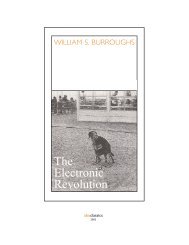Franco ''Bifo'' Berardi - The Soul at Work From Alienation to Autonomy
Franco ''Bifo'' Berardi - The Soul at Work From Alienation to Autonomy
Franco ''Bifo'' Berardi - The Soul at Work From Alienation to Autonomy
Create successful ePaper yourself
Turn your PDF publications into a flip-book with our unique Google optimized e-Paper software.
civiliz<strong>at</strong>ion. Only the estrangement from labor makes liber<strong>at</strong>ory<br />
dynamics possible, shifting the flow of desire from (industrial) repetition<br />
<strong>to</strong>wards (cognitive) difference. <strong>The</strong> concept of estrangement<br />
implies an intentionality th<strong>at</strong> is determined by an estranged behavior.<br />
capital.<br />
Estranged from wh<strong>at</strong>? <strong>From</strong> all forms of labor dependent on<br />
<strong>Work</strong>ers do not suffer from their alien<strong>at</strong>ion when they Can<br />
transform it in<strong>to</strong> active estrangement, th<strong>at</strong> is <strong>to</strong> say, in<strong>to</strong> refusal.<br />
r f humanity and not as the condition of those who are forced<br />
Iorm 0<br />
'<br />
<strong>to</strong> renounce their essential humanity.<br />
Trond writes of the working class as a "rude pagan race,"<br />
addressing Marcuse's idealism and the irrelevance of the humanistic<br />
and theological perspectives th<strong>at</strong> it projects on<strong>to</strong> the reality of<br />
proletarian social composition, its working conditions, but also on<br />
the process of socializ<strong>at</strong>ion and struggle th<strong>at</strong> workers are able <strong>to</strong><br />
effectu<strong>at</strong>e in metropolitan areas.<br />
"<strong>The</strong> working dass confronts its own labor as capital, as a hostile<br />
force, as an enemy-this is the pOint of departure not only<br />
for the antagonism, but for the organiz<strong>at</strong>ion of the antagonism.<br />
If the alien<strong>at</strong>ion of the worker has any meaning, it is a highly<br />
revolutionary one. <strong>The</strong> organiz<strong>at</strong>ion of alien<strong>at</strong>ion: This is the<br />
only possible direction in which the party can lead the spontaneity<br />
of the dass. <strong>The</strong> goal remains th<strong>at</strong> of refusal, <strong>at</strong> a higher<br />
level: It becomes active and collective, a political refusal on a<br />
mass scale, organized and planned. Hence, the immedi<strong>at</strong>e task<br />
of working-class organiz<strong>at</strong>ion is <strong>to</strong> overcome passivity , ) 1 2<br />
<strong>The</strong> alien<strong>at</strong>ion Tronti discusses is not described in humanistic terms<br />
(loss of the human essence) but a condition of estrangement from the<br />
mode of production and its rules, as refusal of work. <strong>The</strong> <strong>Work</strong>erist<br />
Compositionist thinking style distinguishes itself for this overturning<br />
of humanistic connot<strong>at</strong>ions: wh<strong>at</strong> is seen by the neg<strong>at</strong>ive thought of<br />
humanistic deriv<strong>at</strong>ion as a sign of alien<strong>at</strong>ion, is seen by the <strong>Work</strong>erist<br />
Compositionists as a sign of estrangement, a refusal <strong>to</strong> identifY with<br />
the general interest of the capitalistic economy. Th<strong>at</strong> is <strong>to</strong> say, it is seen<br />
as the condition of those who rebel assuming their partial humanity<br />
as a point of strength, a premise of a higher social form, of a higher<br />
Tronti and Marcuse<br />
In one of his most influential books, One Dimensional Man, published<br />
in the U.S. in 1964, Herbert Marcuse foresees for the working<br />
class a destiny of integr<strong>at</strong>ion in<strong>to</strong> the capitalistic system. Consequently,<br />
he sees the necessity, for those willing <strong>to</strong> change the social<br />
order, of shifting their political <strong>at</strong>tention <strong>to</strong>wards the domain of<br />
extra-productive marginalities and away from the direct domain of<br />
the productive rel<strong>at</strong>ion. Marcuse's analysis had consistent effects on<br />
the youth culture of the time, since it seemed <strong>to</strong> anticip<strong>at</strong>e the<br />
student movements as a leading force of the anti-capitalistic struggle<br />
in order <strong>to</strong> replace an already integr<strong>at</strong>ed working class th<strong>at</strong> is already<br />
irretrievable for the purpose of revolutionary conflict.<br />
"In Marcuse's book, the youth of 1968 fOund the <strong>to</strong>pics and<br />
the words needed <strong>to</strong> give definite form <strong>to</strong> an idea th<strong>at</strong> had<br />
already been circul<strong>at</strong>ing in Europe for a while, but in a less<br />
articul<strong>at</strong>e way. It was the idea th<strong>at</strong> European societies, only<br />
twenty years after Fascism and war had ended, were already<br />
blocked societies. [. . . J <strong>The</strong>y were blocked even <strong>at</strong> the level of<br />
hope for future changes, since youth considered the major<br />
46 / <strong>The</strong> <strong>Soul</strong> <strong>at</strong> <strong>Work</strong><br />
Labor and Alien<strong>at</strong>ion in the philosophy of the 1960s / 47




